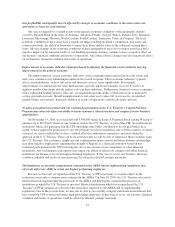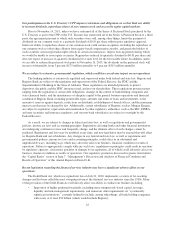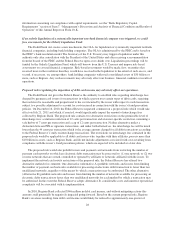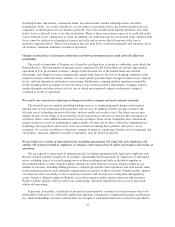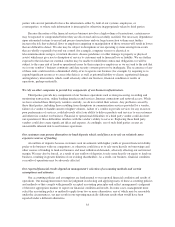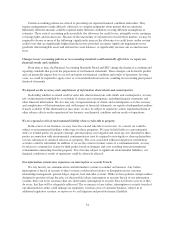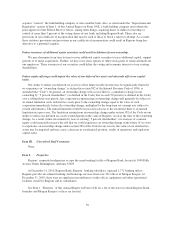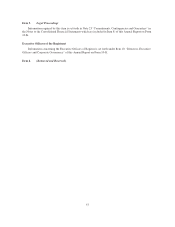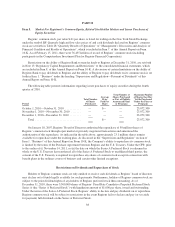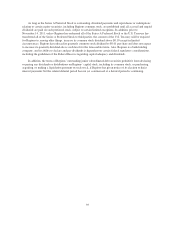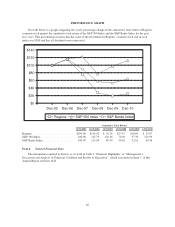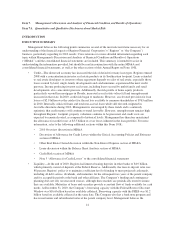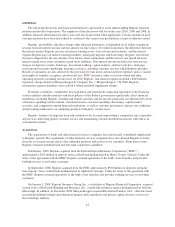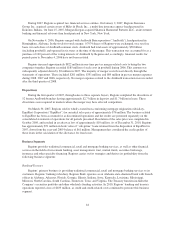Regions Bank 2010 Annual Report Download - page 48
Download and view the complete annual report
Please find page 48 of the 2010 Regions Bank annual report below. You can navigate through the pages in the report by either clicking on the pages listed below, or by using the keyword search tool below to find specific information within the annual report.Certain accounting policies are critical to presenting our reported financial condition and results. They
require management to make difficult, subjective or complex judgments about matters that are uncertain.
Materially different amounts could be reported under different conditions or using different assumptions or
estimates. These critical accounting policies include: the allowance for credit losses; intangible assets; mortgage
servicing rights; and income taxes. Because of the uncertainty of estimates involved in these matters, we may be
required to do one or more of the following: significantly increase the allowance for credit losses and/or sustain
credit losses that are significantly higher than the reserve provided; recognize significant impairment on our
goodwill, other intangible assets and deferred tax asset balances; or significantly increase our accrued income
taxes.
Changes in our accounting policies or in accounting standards could materially affect how we report our
financial results and condition.
From time to time, the Financial Accounting Standards Board and SEC change the financial accounting and
reporting standards that govern the preparation of our financial statements. These changes can be hard to predict
and can materially impact how we record and report our financial condition and results of operations. In some
cases, we could be required to apply a new or revised standard retroactively, resulting in us restating prior period
financial statements.
We depend on the accuracy and completeness of information about clients and counterparties.
In deciding whether to extend credit or enter into other transactions with clients and counterparties, we may
rely on information furnished by or on behalf of clients and counterparties, including financial statements and
other financial information. We also may rely on representations of clients and counterparties as to the accuracy
and completeness of that information and, with respect to financial statements, on reports of independent auditors
if made available. If this information is inaccurate, we may be subject to regulatory action, reputational harm or
other adverse effects on the operation of our business, our financial condition and our results of operations.
We are exposed to risk of environmental liability when we take title to property.
In the course of our business, we may foreclose on and take title to real estate. As a result, we could be
subject to environmental liabilities with respect to these properties. We may be held liable to a governmental
entity or to third parties for property damage, personal injury, investigation and clean-up costs incurred by these
parties in connection with environmental contamination or may be required to investigate or clean up hazardous
or toxic substances or chemical releases at a property. The costs associated with investigation or remediation
activities could be substantial. In addition, if we are the owner or former owner of a contaminated site, we may
be subject to common law claims by third parties based on damages and costs resulting from environmental
contamination emanating from the property. If we become subject to significant environmental liabilities, our
financial condition or results of operations could be adversely affected.
Our information systems may experience an interruption or security breach.
We rely heavily on communications and information systems to conduct our business. Any failure,
interruption or breach in security of these systems could result in failures or disruptions in our customer
relationship management, general ledger, deposit, loan and other systems. While we have policies and procedures
designed to prevent or limit the effect of the possible failure, interruption or security breach of our information
systems, there can be no assurance that any such failure, interruption or security breach will not occur or, if they
do occur, that they will be adequately addressed. The occurrence of any failure, interruption or security breach of
our information systems could damage our reputation, result in a loss of customer business, subject us to
additional regulatory scrutiny, or expose us to civil litigation and possible financial liability.
34


